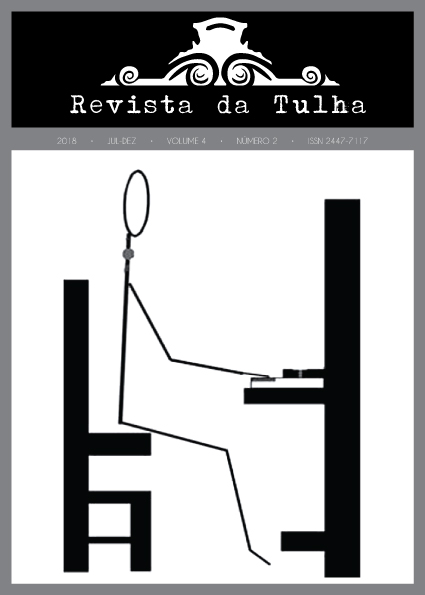Between the musical legacy and the rediscovery of listening in postmodernity
paths for a new music in Luciano Berio
DOI:
https://doi.org/10.11606/issn.2447-7117.rt.2018.153035Keywords:
listening, sound studies, contemporary music, Luciano Berio, Listening, Sound Studies, COntemporary Music, Luciano BerioAbstract
This paper aims at examining, first of all, Seth Kim-Cohen’s argument according to which the mid 20th century represented a hallmark in arts, with the beginning of a deep cultural “epistemological and ontological turn". In music, the turning point was the year of 1948, when, for Kim-Cohen, three decisive events came together. First, the beginning of engineer Pierre Schaeffer's sonorous experiments, in the ORTF studios (Office of Radiodiffusion Télévision Française) and, secondly, the first silent composition by John Cage. Together, they meant the release of the principles of concrete music and of aleatoric music as an alternative to western erudite music paradigm. The third event refers to Muddy Water's pioneering electric recordings. In this case the technology used both in recording and in sound reproduction amplifies and modifies, on the one hand, the acoustic sound and, on the other hand, interferes in the presence / absence relation given by the interaction between the musicians themselves in musical performance, between musicians and listeners and between sound production and acoustic space, besides making possible the wide circulation and utilization of musical pieces.
For understanding the effect of 20th century’s new technology in sound production and reproduction over postmodernity musical listening and composition, we focuse such effects in what they relate to composer Luciano Berio’s poetics as both a musical and aesthetical thought. The choice of this composer among so many others is justified first and foremost by the particular way in which he articulates many of the questions that presented themselves to his generation, especially those between legacy, rupture and innovation, between sound-in-itself and the implicit meanings of his choices, between his personal journey and the awareness of his time, between personal expression and the feeling of historical responsibility and, finally, between representation of nationality and alterity.
Downloads
References
BATISTA, José Carlos. As políticas de igualdade racial nos Estados Unidos e no Brasil: constituição, diferenças e similaridades. Tese: UFMG (Faculdade de Filosofia e Ciências Humanas), 2016.
BENJAMIM, Walter. A obra de arte na época de suas técnicas de reprodução. Tradução: José Lino Grünnewald. São Paulo: Abril S.A. Cultural e Industrial (Os pensadores), 1975.
BERIO, L. Entrevista sobre a música contemporânea (realizada por Rossana Dalmonte). Tradução: Álvaro Lorencini e Letizia Zini Nunes. São Paulo: Editora Civilização Brasileira, 1981.
BONAFÉ, Valéria Muelas. Estratégias composicionais de Luciano Berio a partir de uma análise da Sonata per pianoforte (2001). Dissertação (Mestrado) – Escola de Comunicações e Artes/ Universidade de São Paulo.
CAGE, John. Silence: lectures and writings. Middletown: Wesleyen University Press, 1973.
DANTAS, Denise. O cenário pós-industrial: modificações no ambiente do objeto na sociedade contemporânea e seus novos paradigmas. Revista Pós, n.22. São Paulo, Dezembro de 2008, p. 122-140. Disponível em: file:///C:/Users/Daniela/Downloads/43536-Texto%20do%20artigo-51973-1-10-20120919.pdf Acesso: 19/12/2018.
KIM-COHEN, Seth. In the blink of na ear: toward a non-cochlear sonic art. New York: Continuum, 2009.
SCHAFER, R. Murray. O ouvido pensante. Tradução: Marisa T. Fonterrada, Magda R. Gomes da Silva, Maria Lúcia Pascoal. São Paulo: Fundação Editora da UNESP, 1991.
SCHAEFFER, Pierre. “La Musique Par Exemple. Positions et Propositions Sur Le Traité Des Objets Musicaux.” Musique En Jeu, 25, November 1976, 32–38. Disponível em: https://drive.google.com/file/d/12jpb-oTPNOsJqx5SnF4ZmjT3r8rsim3t Ac
_________________. Traité des objets musicaux – essais interdisciplines. Paris: Éditions du Seuil, 1966.
Downloads
Published
Issue
Section
License
Copyright (c) 2018 Daniela Amaral Rodrigues Nicoletti

This work is licensed under a Creative Commons Attribution 4.0 International License.
Authors retain copyright and grant the journal the right to first publication, with the work licensed under the Creative Commons Attribution License CC-BY-NC:
This work is licensed under a Creative Commons Attribution 4.0 International License.



